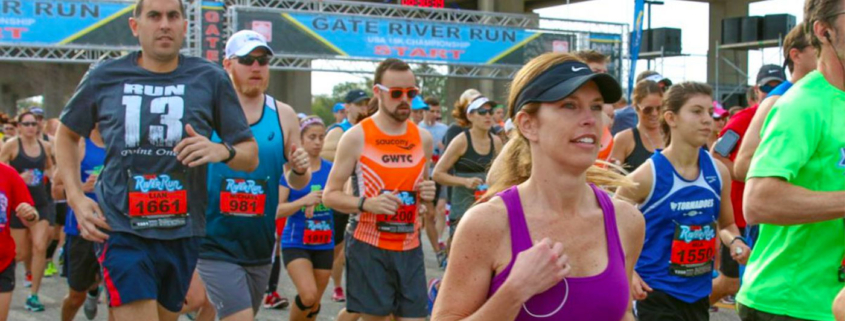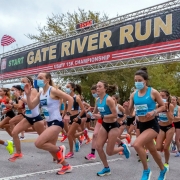Would You Run or Ride
We’ve always been an events town. You could set your schedule around what was happening during the year. Just about everybody knew when the Daytona 500 was happening, the Gate River Run, The Players, The Kingfish Tournament, opening weekend for the Jaguars and Florida/Georgia. Add in the Jazz Festival, the various shrimp festivals, opening of the beaches, World of Nations and a variety of other yearly events and there was always something going on.
I’d get about a dozen calls in the first three months of every year from women asking the specific date of the Florida/Georgia game. I’d pass it along and the response would always be the same.
“Good, I wanted to make sure I don’t get married that weekend.”
I always thought it was amusing that no guys called and asked me that question.
For the past few months, all of that has been gone. The number of events happening is near zero and just now organizers are exploring how to get people together for an event while keeping them apart.
“We want people to feel comfortable,” Gate River Run director Doug Alred said this week. Alred’s 1st Place Sports running organization administers the Gate River Run each year along with over 120 other races on the calendar. Since the Gate on March 7th there have been almost none. Over a hundred races and runs have been cancelled.
“I did hear about a run on the 4th of July in Ponte Vedra but we haven’t been able to put anything on,” Alred explained. “I shouldn’t say none,” he added. “We did something for Marathon High last month. We started ten people every ten minutes over two days. We told them ‘Don’t come hang around the start or the finish.’ We had 320 people participate with no problem. Chip timing helps with holding people back and not starting in one pack. They cross over the mats at the start line and go.”
Trying to figure out how to get “participation sports” back on the calendar, Alred’s organization sent out a survey last week trying to gauge what people are looking for when it comes to being in large groups. Eight percent of the respondents said they’re not coming out no matter what. Seventy percent said they’d probably participate. But almost everybody’s comfort level dropped off when the races got longer than a 5K. And if the event was more than 500 participants, interest started to wane.
“Nobody wanted to run in a 1000 person event,” Alred said of the results.
“We’re more worried about everybody’s safety, the athletes, the staff, the families,” Rich Hincapie, President of Hincapie Sports explained. Hincapie Sports puts on national bike rides around the country called “Gran Fondo’s” every year but none have happened in 2020. “We called off our Ft. Worth ride in March because we didn’t have enough knowledge at the time.”
Hincapie joined a national Cycling Event Task Force with twenty other event organizers, cyclists and medical professionals from around the country to try and figure out how to get things done. Over the last five months they’ve gone through multiple scenarios and put together a sixteen-page guide called “Race Management Guidelines for the Covid-19 Era.” It covers medical considerations, government regulations, athlete, fan and sponsorship guidelines as well as marketing ideas for the future.
“The more education we get the better,” he explained. “Having specific starting times, corrals for small groups, how to social distance at the start and the finish, all of those things that go into putting an event on safely.”
Both Hincapie and Alred agree that it’ll be an evolving consideration about how to put on events where people will feel comfortable participating.
“Things like keep your mask on until the start, or you can wear it if you want to,” Alred said. “Maybe a loosely fitting bandana. I’m sure somebody will come up with something that works for runners soon.”
“Most everybody we talked to, athletes, sponsors, volunteers had the same response: ‘Do something.’” Hincapie explained. “That’s what people are looking for, the idea that as the organizer you’ve taken the precautions, you’ve thought it out with social distancing, mask wearing, hand sanitizer, all of that.”
Using the current guidelines, organizers are trying to restart very soon. Just this week the annual “Tour de Pain” road race was moved to the beach and scheduled for August 22nd. The annual Hincapie Gran Fondo in Greenville, S.C. is on the calendar for late October.
The cost of organizing a run or a ride will be a factor in how many can happen going forward.
“We want to return to running but we’ll have to pick and choose what we can afford to do,” Alred, who has a four person, full-time organizing staff, explained.
“We can do a 250-person run on the beach because we don’t have to hire the number of police we’d need for a run on the roads.”
“Cycling events aren’t necessarily a money making proposition,” Hincapie explained. “With around two thousand riders we can use them as a marketing tool for our sportswear company.” He added that the plan to expand to ten events a year is still on the table. And Jacksonville is one place Hincapie admitted would be attractive for a future Gran Fondo.
Alred explained that the Tour de Pain will start with 250 spots open to see what kind of response they get. If it fills up they’ll have five different starting times of fifty runners each starting ten minutes apart.
“We’ll spread things out at the beach, no sense crowding up, no packet pick up and have no crowds, that’s our goal,” Alred said.
With that kind of spacing, and if there’s enough interest, they might be able to expand the number of participants. But projecting that out to 20,000 runners for the Gate River Run next March is a stretch.
“Under the current guidelines, the Gate is in peril,” Alred said. “I’ve got my fingers crossed that Covid cases are decreasing over the next few months. Even after a vaccine I think people will wait and see what happens.”
“The responsibility eventually falls to the athlete,” Hincapie said. “We’re not going to test everybody, that’s not for us to say, ‘You’re ok, go do what you want.’ There’s a small chance of transmission on a bike ride. It’s our responsibility to make things as safe as possible.”





